
Find Help
More Items From Ergsy search
-
Can lifestyle changes also help prevent colorectal cancer?
Relevance: 100%
-
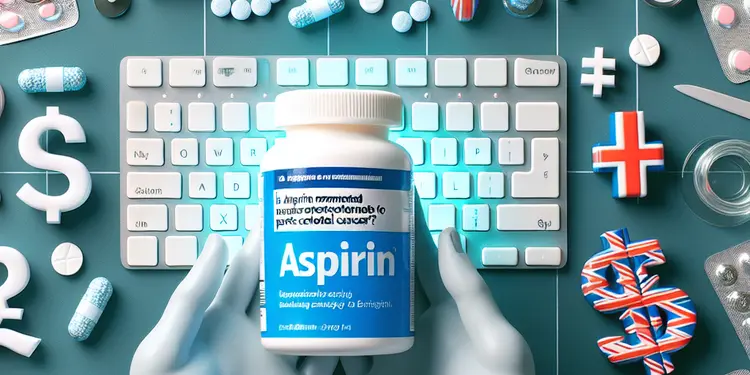
Is aspirin recommended for everyone to prevent colorectal cancer?
Relevance: 75%
-

What is colorectal cancer?
Relevance: 71%
-

Can lifestyle changes help prevent testicular cancer?
Relevance: 69%
-

What factors increase my risk of colorectal cancer?
Relevance: 66%
-
Is aspirin more effective for certain age groups in preventing colorectal cancer?
Relevance: 64%
-

Can aspirin stop colorectal cancer?
Relevance: 64%
-

Should people with a family history of colorectal cancer take aspirin?
Relevance: 64%
-
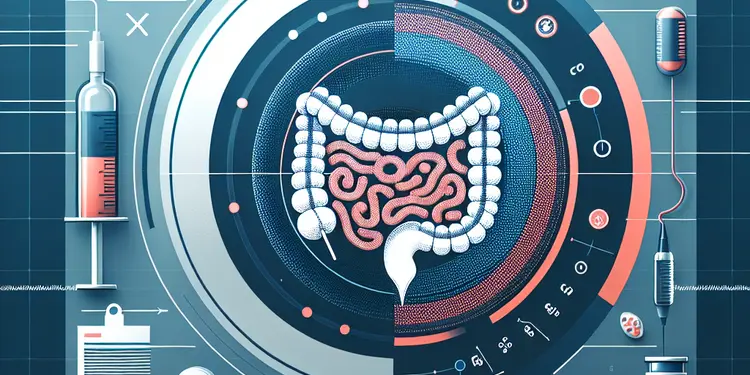
Is genetic testing available for colorectal cancer?
Relevance: 62%
-

What are the recommendations for colorectal cancer screening?
Relevance: 61%
-

Has aspirin been proven to cure colorectal cancer?
Relevance: 61%
-

How can I test myself for colorectal cancer?
Relevance: 61%
-

How often should I perform a home colorectal cancer test?
Relevance: 58%
-

Will insurance cover the cost of home colorectal cancer tests?
Relevance: 58%
-

Are there risks associated with home colorectal cancer tests?
Relevance: 58%
-

Can lifestyle changes help reduce bowel cancer risk?
Relevance: 57%
-

Can home colorectal cancer tests replace a colonoscopy?
Relevance: 57%
-

Can lifestyle changes impact the efficacy of cancer screening?
Relevance: 56%
-

What are the advantages of an at-home colorectal cancer test?
Relevance: 56%
-

Can aspirin prevent colorectal cancer?
Relevance: 55%
-

Can lifestyle factors influence the results of a colorectal cancer test?
Relevance: 54%
-

What lifestyle changes can help lower the risk of bowel cancer?
Relevance: 53%
-

Can diet or lifestyle changes prevent appendicitis?
Relevance: 53%
-

Can lifestyle changes complement prostate cancer treatment?
Relevance: 53%
-

Can bowel cancer be prevented?
Relevance: 53%
-
Is aspirin effective in preventing other types of cancer?
Relevance: 52%
-

What should I do if I'm considering aspirin for cancer prevention?
Relevance: 52%
-
How long do studies suggest taking aspirin for cancer prevention?
Relevance: 48%
-

Can lifestyle changes help prevent Super Flu?
Relevance: 48%
-

What dosage of aspirin is considered effective for cancer prevention?
Relevance: 48%
-

What lifestyle changes can aid in prostate cancer recovery?
Relevance: 48%
-

What do health organizations say about aspirin and cancer prevention?
Relevance: 46%
-
Has the FDA approved aspirin for cancer prevention?
Relevance: 46%
-

Can lifestyle changes reduce the need for medication for heart disease prevention?
Relevance: 45%
-

Are home tests for colorectal cancer accurate?
Relevance: 43%
-
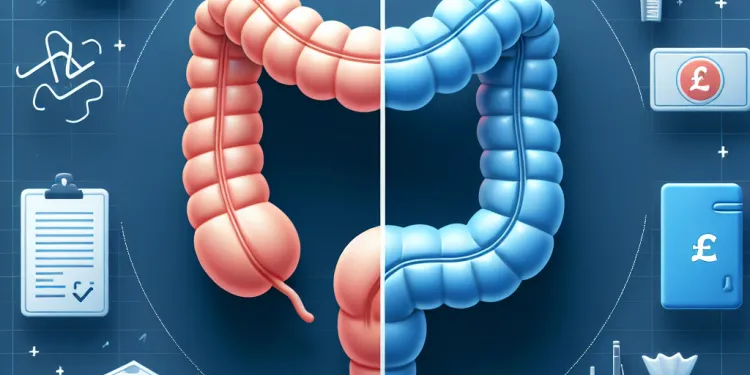
What is the difference between colon cancer and rectal cancer?
Relevance: 42%
-
Are there ongoing studies about aspirin and colorectal cancer?
Relevance: 42%
-
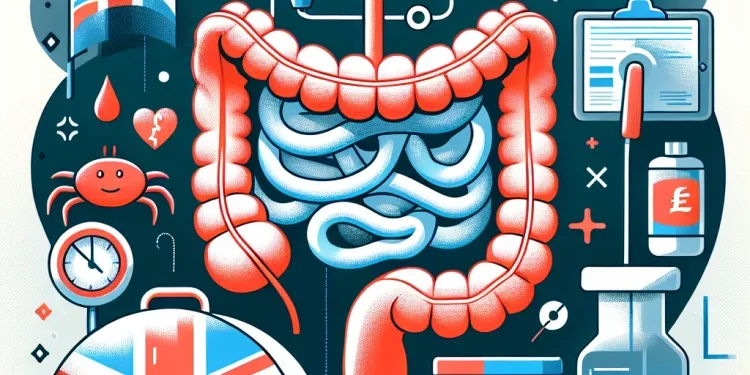
What is Bowel Cancer?
Relevance: 41%
-
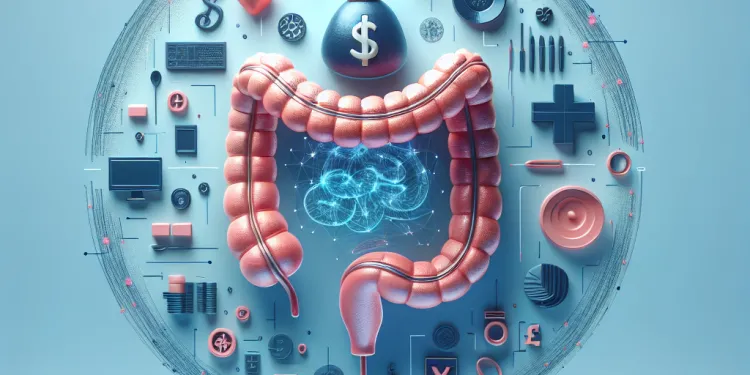
How common is bowel cancer?
Relevance: 40%
-

How does family history affect the risk of bowel cancer?
Relevance: 40%
Introduction
Colorectal cancer is a significant health concern in the UK, affecting thousands of individuals each year. While genetic factors play a role in the development of this disease, lifestyle choices significantly impact its prevention. Understanding how lifestyle changes can reduce the risk of colorectal cancer is crucial for better health outcomes.
Dietary Habits
A balanced diet is fundamental in reducing the risk of colorectal cancer. High consumption of red and processed meats has been linked to an increased risk of developing this type of cancer. Instead, adopting a diet rich in fruits, vegetables, whole grains, and lean proteins is recommended. These foods contain essential nutrients and fibre that help promote digestive health and may reduce cancer risks. Furthermore, reducing the intake of fatty and sugary foods can contribute to a healthier weight, which is another factor in cancer prevention.
Physical Activity
Regular physical activity is another vital component in preventing colorectal cancer. Engaging in moderate to vigorous exercise for at least 150 minutes per week can help maintain a healthy weight and improve overall health. Physical activity aids in regulating body functions and reducing inflammation, which could decrease the risk of cancer development. Activities such as walking, cycling, gardening, or participating in organised sports are effective ways to achieve these health benefits.
Alcohol and Smoking
Limiting alcohol consumption is an important measure in colorectal cancer prevention. Excessive alcohol intake has been associated with an increased risk of various cancers, including colorectal. The UK guidelines recommend not regularly drinking more than 14 units of alcohol per week. Additionally, smoking cessation is critical, as tobacco use is a known carcinogen and significantly elevates cancer risk. Support for quitting smoking is available through various UK health services.
Regular Screenings
While not a lifestyle change per se, regular screenings are essential for early detection and prevention of colorectal cancer. In the UK, individuals between 60 and 74 are invited for bowel cancer screening every two years. These screenings can detect precancerous conditions, allowing for early intervention. Adopting healthy lifestyle practices alongside regular screenings enhances overall preventive measures against colorectal cancer.
Conclusion
Implementing lifestyle changes such as a nutritious diet, regular exercise, moderating alcohol intake, and avoiding tobacco can significantly lower the risk of colorectal cancer. Coupled with regular screenings, these measures empower individuals to take an active role in their health. By making informed choices and adapting healthier habits, it is possible to improve overall wellbeing and reduce the likelihood of developing colorectal cancer. Public awareness and individual commitment to lifestyle modifications can make a substantial difference in cancer prevention across the UK.
Introduction
Colorectal cancer is a big health issue in the UK. Many people get it each year. It can be caused by your genes, but how you live your life can also affect it. Understanding how changing your lifestyle can help prevent this cancer is important for staying healthy.
Dietary Habits
Eating a balanced diet can help lower the risk of colorectal cancer. Eating a lot of red and processed meats can increase the risk. It is better to eat more fruits, vegetables, whole grains, and lean proteins like chicken or fish. These foods have important nutrients and fibre that help keep your stomach and intestines healthy. Eating less fatty and sugary foods can also help you stay at a healthy weight, which is important for preventing cancer.
Physical Activity
Being active is very important to help prevent colorectal cancer. Try to do physical activities like walking, cycling, or playing sports for at least 150 minutes every week. Regular exercise helps you stay at a healthy weight and keeps your body working well. This can lower the risk of getting cancer.
Alcohol and Smoking
Drinking less alcohol is important to help prevent cancer. Drinking too much alcohol can increase the risk of getting different types of cancer, including colorectal cancer. It is recommended not to drink more than 14 units of alcohol each week. Also, stopping smoking is very important because using tobacco is known to cause cancer. There is support available in the UK to help people quit smoking.
Regular Screenings
Regular screenings help find colorectal cancer early. In the UK, people aged 60 to 74 are invited to have a bowel cancer screening every two years. These screenings can find signs of cancer before it fully develops. Along with a healthy lifestyle, regular screenings are an important way to prevent colorectal cancer from growing.
Conclusion
Making changes like eating healthy foods, being active, drinking less alcohol, and not smoking can lower the risk of colorectal cancer. Regular check-ups are also important. By making good choices and healthy changes, people can take control of their health and reduce the chance of getting cancer. It is important for everyone to know about these changes and stick to them to help prevent cancer in the UK.
Frequently Asked Questions
Can lifestyle changes help prevent colorectal cancer?
Yes, lifestyle changes can significantly reduce the risk of developing colorectal cancer.
What types of lifestyle changes can help prevent colorectal cancer?
Lifestyle changes such as a healthy diet, regular exercise, maintaining a healthy weight, and avoiding smoking and excessive alcohol consumption can help prevent colorectal cancer.
How does diet affect the risk of colorectal cancer?
A diet high in fruits, vegetables, and whole grains and low in red and processed meats can lower the risk of colorectal cancer.
Is physical activity important in reducing the risk of colorectal cancer?
Yes, regular physical activity can lower the risk of colorectal cancer by helping to maintain a healthy weight and improve overall health.
How does obesity influence colorectal cancer risk?
Obesity is associated with an increased risk of colorectal cancer, so maintaining a healthy weight is important for prevention.
Does smoking impact colorectal cancer risk?
Yes, smoking is a risk factor for many types of cancer, including colorectal cancer, so quitting smoking can reduce risk.
Can alcohol consumption affect colorectal cancer risk?
Yes, excessive alcohol consumption can increase the risk of colorectal cancer. It's best to limit alcohol intake to moderate levels.
How much fiber should I consume to help prevent colorectal cancer?
It's recommended to consume at least 25-30 grams of fiber daily from fruits, vegetables, and whole grains to help lower the risk.
Is there a link between processed meat and colorectal cancer?
Yes, consuming high amounts of processed meat has been linked to an increased risk of colorectal cancer. Limiting intake is advised.
Can regular screenings help prevent colorectal cancer?
While not a lifestyle change, regular screenings can detect precancerous polyps that can be removed to prevent cancer from developing.
Why is it important to avoid sedentary behavior?
Sedentary behavior is linked to obesity and an increased risk of colorectal cancer, so staying active is important for prevention.
Does vitamin D play a role in colorectal cancer prevention?
Some studies suggest that adequate vitamin D levels may be linked to a lower risk of colorectal cancer, though more research is needed.
How does inflammation relate to colorectal cancer risk?
Chronic inflammation can increase the risk of cancer, including colorectal cancer. Eating an anti-inflammatory diet may help reduce risk.
Can stress management be a part of lowering colorectal cancer risk?
While stress alone isn't directly linked to colorectal cancer, managing stress can lead to healthier lifestyle choices that reduce cancer risk.
How can I reduce my intake of unhealthy fats to prevent colorectal cancer?
Reducing fried foods and opting for healthier fats like those from fish, nuts, and olive oil can help lower colorectal cancer risk.
Are antioxidants beneficial in preventing colorectal cancer?
Antioxidants found in fruits and vegetables can help protect cells from damage and may lower colorectal cancer risk.
What role does hydration play in colorectal cancer prevention?
Staying well-hydrated supports healthy digestion and may help reduce the risk of colorectal cancer.
Can probiotics and a healthy gut microbiome influence colorectal cancer risk?
A healthy gut microbiome can support digestion and immune function, potentially lowering colorectal cancer risk.
Is there a link between diabetes and colorectal cancer risk?
Yes, people with type 2 diabetes have a higher risk of colorectal cancer. Managing diabetes through lifestyle can mitigate this risk.
Why is it important to know my family history regarding colorectal cancer?
A family history of colorectal cancer may increase your risk, making lifestyle changes and screenings even more crucial.
Can changing how we live stop bowel cancer?
Yes, changing how you live can really help lower the chance of getting bowel cancer.
How can changing the way you live help stop bowel cancer?
Making some changes to how you live can help stop bowel cancer. Eat healthy food, exercise often, keep a healthy weight, and try not to smoke or drink too much alcohol.
For more help, you can use picture charts or ask someone to explain these tips to you.
How does what we eat change the chance of getting bowel cancer?
Eating lots of fruits, vegetables, and whole grains is good for you. Try not to eat too much red meat like beef or pork. Also, avoid processed meats like sausages and bacon. This can help you stay healthy and avoid cancer in your tummy, called colorectal cancer.
Helpful tip: You can use picture charts to help you plan your meals. This makes it easier to remember what to eat. Also, cooking with family or friends can make it fun to try new healthy foods together.
Is moving your body important to lower the risk of bowel cancer?
Yes, moving your body often can help lower the risk of getting bowel cancer. It helps you stay at a healthy weight and feel better overall.
How does being very overweight affect the chance of getting bowel cancer?
Being very overweight can make it more likely to get bowel cancer. This is because extra body fat can change how our body works.
Here are some tips and tools to understand better:
- Talk to a doctor or a nurse. They can help explain.
- Use pictures or videos to learn more.
- Read with a family member or a friend. They can help you understand.
Being very overweight can make it more likely to get bowel cancer. Keeping a healthy weight helps you stay well.
Can smoking cause bowel cancer?
Smoking can cause many types of cancer, like bowel cancer. If you stop smoking, you can lower your chance of getting cancer.
Does drinking alcohol change the chance of getting bowel cancer?
Drinking too much alcohol can make it more likely for you to get bowel cancer. It's better to drink only a little bit of alcohol.
How much fiber should I eat to help stop bowel cancer?
Eating the right amount of fiber is good for your tummy. It can help stop you from getting bowel cancer. Bowel cancer is a kind of sickness in the part of your body where food goes out.
Here are some tips to remember:
- Try to eat foods with lots of fiber every day. Foods like fruits, vegetables, whole grains, beans, and nuts are good.
- It's good to get advice from a doctor or a nurse to know what is best for you.
- Using a calendar or a notebook can help you keep track of the foods you eat.
- There are apps that can help you remember to eat foods with fiber.
Eat 25 to 30 grams of fiber every day. You can get fiber from fruits, vegetables, and whole grains. This helps keep you healthy.
Does eating processed meat cause bowel cancer?
Eating a lot of processed meat might make it more likely to get bowel cancer.
Processed meat includes things like bacon, sausages, and ham.
If you want to eat less processed meat, try swapping it for chicken or fish.
Using tools like picture guides or talking to someone can help you understand better.
Eating a lot of processed meat, like sausages and bacon, can make it more likely to get a type of cancer that affects the bowel. It's a good idea to eat less of these meats.
Can regular check-ups stop bowel cancer?
Going for health check-ups can help find problems early. This is important to stop cancer from growing. Talk to a doctor about getting checked.
Tools to help:
- Ask someone you trust to go with you to appointments.
- Use pictures and simple words to understand better.
Regular health checks can find small growths called polyps. Doctors can take these out to stop cancer before it starts. This is not a lifestyle change.
Why is it important to move around and not sit too much?
Sitting a lot is not good for you. It is important to move your body.
Here are some reasons why moving is good:
- It keeps you healthy – Moving helps your heart and muscles stay strong.
- It makes you feel good – Exercise can make you feel happy and full of energy.
- It helps you think better – Moving around can help your brain work well.
Tips to move more:
- Walk or play outside.
- Dance to your favorite songs.
- Stand up and stretch when watching TV.
Sitting too much can make you gain weight and might cause bowel cancer. It is good to move around and be active to stay healthy and help stop these problems.
Does vitamin D help stop bowel cancer?
We are talking about a type of cancer that affects the bowel, which is a part of your tummy. This is called bowel cancer or colorectal cancer.
Some people think that vitamin D might help stop this cancer. Vitamin D comes from sunlight and some foods.
Here’s how you can learn more and get help:
- Ask your doctor - Doctors can explain about vitamin D and health.
- Read simple guides - Look for books with pictures and simple words about health.
- Use apps - Some apps can help explain health information in easy words.
Some studies say having enough vitamin D might help lower the chance of getting bowel cancer. But scientists need to study more to be sure.
How is swelling linked to the risk of bowel cancer?
Swelling is when a part of your body gets red, hot, or sore. It can happen when your body is fighting an illness. Scientists are finding out that if you have a lot of swelling in your body, it might make it easier to get bowel cancer. This is a type of cancer in your intestines.
If you are worried about swelling, talk to your doctor. Eating healthy foods, exercising, and not smoking can help reduce swelling and lower cancer risk.
You can use tools like pictures or videos to learn more. Talking to a helper, like a family member or teacher, can also be useful.
When the body is swollen and sore for a long time, it can make the chance of getting cancer go up. This includes cancer in the bowel, which is called colorectal cancer. Eating foods that help stop swelling can help lower the chance of getting cancer.
Can handling stress help lower the chance of getting bowel cancer?
Stress by itself doesn't cause bowel cancer. But handling stress well can help you make healthy choices. These choices can lower the chances of getting cancer.
How can I eat less unhealthy fat to help stop bowel cancer?
Eating less fried food is good for your health. Try to eat healthy fats instead. These are in fish, nuts, and olive oil. Eating these foods can help lower the risk of getting colorectal cancer.
Do antioxidants help stop bowel cancer?
Fruits and vegetables have special things in them called antioxidants. These help keep our body’s cells safe and can lower the chance of getting a type of cancer called colorectal cancer.
How does drinking water help prevent bowel cancer?
Drinking enough water is important for keeping your body healthy. It helps your stomach and bowels work well. This can lower the risk of bowel cancer. Try to drink water every day.
You can use a water bottle or set reminders to help you remember to drink water.
Drinking enough water keeps your stomach and intestines healthy. It might also help lower the chance of getting colon cancer.
Do probiotics and a healthy tummy help prevent colon cancer?
Your tummy has tiny helpers called bacteria that help break down food and keep you healthy. Having good bacteria in your belly can help you stay strong and fight off bugs. It might even help stop tummy problems like cancer.
Can diabetes make you more likely to get bowel cancer?
Yes, people with type 2 diabetes have a higher chance of getting bowel cancer. Living a healthy life can help lower this chance.
Why should I know about my family's health history with bowel cancer?
If someone in your family had bowel cancer, it can make it more likely that you could get it too. This means it is very important to live a healthy life and go for check-ups.
Useful Links
This website offers general information and is not a substitute for professional advice.
Always seek guidance from qualified professionals.
If you have any medical concerns or need urgent help, contact a healthcare professional or emergency services immediately.
- Ergsy carfully checks the information in the videos we provide here.
- Videos shown by Youtube after a video has completed, have NOT been reviewed by ERGSY.
- To view, click the arrow in centre of video.
- Most of the videos you find here will have subtitles and/or closed captions available.
- You may need to turn these on, and choose your preferred language.
- Go to the video you'd like to watch.
- If closed captions (CC) are available, settings will be visible on the bottom right of the video player.
- To turn on Captions, click settings .
- To turn off Captions, click settings again.
More Items From Ergsy search
-
Can lifestyle changes also help prevent colorectal cancer?
Relevance: 100%
-

Is aspirin recommended for everyone to prevent colorectal cancer?
Relevance: 75%
-

What is colorectal cancer?
Relevance: 71%
-

Can lifestyle changes help prevent testicular cancer?
Relevance: 69%
-

What factors increase my risk of colorectal cancer?
Relevance: 66%
-
Is aspirin more effective for certain age groups in preventing colorectal cancer?
Relevance: 64%
-

Can aspirin stop colorectal cancer?
Relevance: 64%
-

Should people with a family history of colorectal cancer take aspirin?
Relevance: 64%
-

Is genetic testing available for colorectal cancer?
Relevance: 62%
-

What are the recommendations for colorectal cancer screening?
Relevance: 61%
-

Has aspirin been proven to cure colorectal cancer?
Relevance: 61%
-

How can I test myself for colorectal cancer?
Relevance: 61%
-

How often should I perform a home colorectal cancer test?
Relevance: 58%
-

Will insurance cover the cost of home colorectal cancer tests?
Relevance: 58%
-

Are there risks associated with home colorectal cancer tests?
Relevance: 58%
-

Can lifestyle changes help reduce bowel cancer risk?
Relevance: 57%
-

Can home colorectal cancer tests replace a colonoscopy?
Relevance: 57%
-

Can lifestyle changes impact the efficacy of cancer screening?
Relevance: 56%
-

What are the advantages of an at-home colorectal cancer test?
Relevance: 56%
-

Can aspirin prevent colorectal cancer?
Relevance: 55%
-

Can lifestyle factors influence the results of a colorectal cancer test?
Relevance: 54%
-

What lifestyle changes can help lower the risk of bowel cancer?
Relevance: 53%
-

Can diet or lifestyle changes prevent appendicitis?
Relevance: 53%
-

Can lifestyle changes complement prostate cancer treatment?
Relevance: 53%
-

Can bowel cancer be prevented?
Relevance: 53%
-
Is aspirin effective in preventing other types of cancer?
Relevance: 52%
-

What should I do if I'm considering aspirin for cancer prevention?
Relevance: 52%
-
How long do studies suggest taking aspirin for cancer prevention?
Relevance: 48%
-

Can lifestyle changes help prevent Super Flu?
Relevance: 48%
-

What dosage of aspirin is considered effective for cancer prevention?
Relevance: 48%
-

What lifestyle changes can aid in prostate cancer recovery?
Relevance: 48%
-

What do health organizations say about aspirin and cancer prevention?
Relevance: 46%
-
Has the FDA approved aspirin for cancer prevention?
Relevance: 46%
-

Can lifestyle changes reduce the need for medication for heart disease prevention?
Relevance: 45%
-

Are home tests for colorectal cancer accurate?
Relevance: 43%
-

What is the difference between colon cancer and rectal cancer?
Relevance: 42%
-
Are there ongoing studies about aspirin and colorectal cancer?
Relevance: 42%
-

What is Bowel Cancer?
Relevance: 41%
-

How common is bowel cancer?
Relevance: 40%
-

How does family history affect the risk of bowel cancer?
Relevance: 40%


